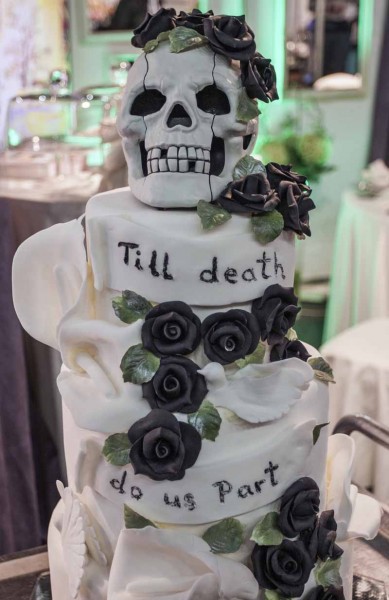
Frankie The Tailor is a recurring character in Rie Warren’s “Carolina Bad Boys” series.
It’s Bridal Fashion Week, and New York’s Seventh Avenue—aka Fashion Avenue—is filled with a different vibe from fashionistas. While the names on the roster remain the same—Vera Wang, Carolina Herrera, Monique Lhuillier topping the list—the feeding frenzy of the womenswear season is gone. What remains are small salon presentations reminiscent of Paris haute couture.
Something else has changed, too. With the resurgence of New York Menswear Week, tuxedos and men’s formal wear are also on the list during this bridal week. Surprisingly, the name being whispered by fashion editors and photographers is not an atelier out of New York, but out of Charleston, South Carolina.
It was a mystery, the kind that sold magazines and generated web hits. That was how I found myself on a mission to uncover the enigma surrounding Frankie the Tailor.
“Frankie the Tailor. What kind of name is that?” my editor asked, crinkling her nose as she signed my travel voucher to approve my trip to Charleston to interview Frankie. “Are you sure he’s legit?”
I nodded. But before I could utter another word, she waved me away. I sighed. My boss could be as acerbic as Anna Wintour, but at least she handed me this assignment, thus giving me a chance to be a fashion journo instead of staying on as her personal assistant.
During the flight from New York to Charleston, I reviewed the info I’d gathered about Frankie the Tailor.
A scion of the Burelli crime family out of New Jersey, Frankie was a true artist. After graduating with honors from Parsons School of Design (the same school Marc Jacobs attended), Frankie gained his Master of Fine Arts from Central Saint Martin’s, London’s foremost fashion school where the likes of Alexander McQueen, John Galliano, and Stella McCartney earned their fashion degrees.
Choosing to stay in Europe, Frankie apprenticed in Savile Row for a year and then moved to Milan where he worked as an assistant designer at a very famous fashion house. He stayed in Italy for three years, dividing his time between Rome, Milan, and Florence before finally coming back home to the States.
Well, that was the official public bio of Frankie Burelli. However, if rumors were to be believed, Frankie stayed in Europe to become his family’s enforcer of overseas interests. The nickname Frankie the Tailor had a double meaning: for his obvious fashion talent and for his cutting and sewing of things that were not necessarily fabric.
Gaining notoriety in Europe, Frankie was being groomed to take over the family’s European operations, with talks of opening his own fashion house in either London or Milan to legitimize his stay. But something happened, and he was called back home.
Whatever the reason was, it didn’t stop Frankie from wanting to launch his own label. Opening a small boutique in Manhattan’s Meatpacking District, Frankie offered bespoke tailoring to the elite. The tags in his made-to-measure suits simply said Burelli.
With everything going so well for the young designer, the cognoscenti were surprised when one day the Burelli storefront was shuttered. They were equally surprised when they heard Frankie had relocated to South Carolina. Why in the world would a major emerging talent move away from the American fashion capital?
That was the question foremost in my mind when I arrived at the door of Frankie’s almost-hidden atelier in a downtown alley in Charleston. The small, discreet premises were typical Charleston brick on a cobblestone street with the Burelli sign so small, I almost missed it.

